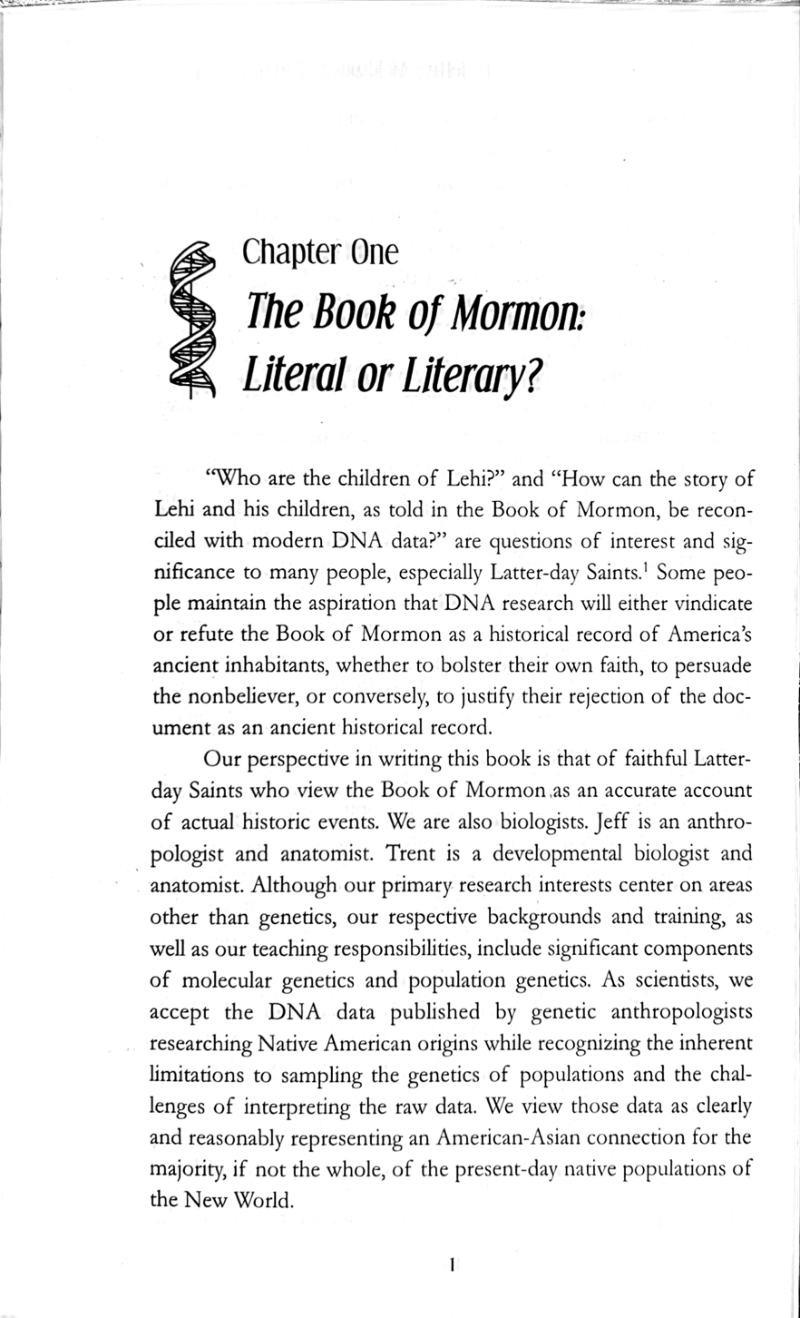D. Jeffrey Meldrum and Trent D. Stephens write book on DNA and the Book of Mormon; conclude DNA is inconclusive evidence for or against historicity.
- Type
- Book
- Source
- D. Jeffrey Meldrum LDS
- Hearsay
- DirectSecondary
- Reference
D. Jeffrey Meldrum and Trent D. Stephens, Who Are the Children of Lehi? (Salt Lake City: Greg Kofford Books, 2007), 1–8
- Scribe/Publisher
- Greg Kofford Books
- People
- D. Jeffrey Meldrum, Trent D. Stephens
- Audience
- Reading Public
- Transcription
"Who are the children of Lehi?" and “How can the story of Lehi and his children, as told in the Book of Mormon, be reconciled with modern DNA data?" are questions of interest and significance to many people, especially Latter-day Saints. Some people maintain the aspiration that DNA research will either vindicate or refute the Book of Mormon as a historical record of America's ancient inhabitants, whether to bolster their own faith, to persuade the nonbeliever, or conversely, to justify their rejection of the document as an ancient historical record.
. . .
As scientists, we accept the DNA data published by genetic anthropologists researching Native American origins while recognizing the inherent limitations to sampling the genetics of populations and the challenges of interpreting the raw data. We view those data as clearly and reasonably representing an American-Asian connection for the majority, if not the whole, of the present-day native populations of the New World.
But we also acknowledge that this conclusion does not constitute a refutation of the historicity of the Book of Mormon. It is only with a combined understanding of the sometimes-subtle details of the primary Book of Mormon account and the complex nature of inheritance that one can attempt to reconcile the written record of the children of Lehi with the genetic legacy of Native American populations studied to date. We contend that the apparent contradiction stems from imposing simplistic generalizations onto the primary account, placing undue significance on speculations by early Church officials, or failing to recognize the limitations on the interpretation of the genetic legacies of populations.
. . .
Stating that there are no modern genetic connections between Native American and Middle Eastern populations does not justify a statement that no such connections ever existed or that the Book of Mormon is a work of nineteenth-century fiction.
. . .
At least three major hypotheses can be advanced concerning the Book of Mormon and Native American origin:
1. All Native Americans are of Asian origin. This hypothesis has dominated mainstream science since the sixteenth century.
2. All Native Americans are of Middle Eastern origin. This hypothesis is advocated by some who accept the Book of Mormon account as historical.
3. Most Native Americans are of Asian origin, while a small subset is of Middle Eastern origin but intermingled with the indigenous people. This hypothesis is proposed by others who also accept the historicity of the Book of Mormon.
. . .
Clearly the current data refute the second hypothesis: “All Native Americans are of Middle Eastern origin." The data do not indicate an affinity of Native American DNA to that of present-day Middle Eastern populations and certainly do not support a sole origin from that source.
. . .
The DNA data collected to date simply connect Native American populations to specific Asian populations. Therefore, the most parsimonious explanation is an Asian origin for modern Native American peoples. However, when considered in the context of the principles and limitations of population genetics, the data do not exclude the possibility of other gene sources which are not yet detected (or which are simply undetectable) by the limited sampling of currently extant populations. One or more relatively small populations, now extinct or genetically overwhelmed in the gene pool of the Western Hemisphere, could have existed but are no longer evident.
. . .
In the final analysis, it is our opinion that the Book of Mormon, like the Bible, is a book of faith. If God proved, without doubt, every whit of the sacred record, then faith, a vital principle, would lose its effect. Hence, our perspective and our motivation for exploring these issues stem mutually from our pursuit of scientific knowledge and understanding as biologists and anthropologists, from our rejection of any over-reaching of interpretation--scientific or scriptural-and from our acceptance of the principle of rational faith in the Book of Mormon.
- Citations in Mormonr Qnas
The B. H. Roberts Foundation is not owned by, operated by, or affiliated with the Church of Jesus Christ of Latter-day Saints.

